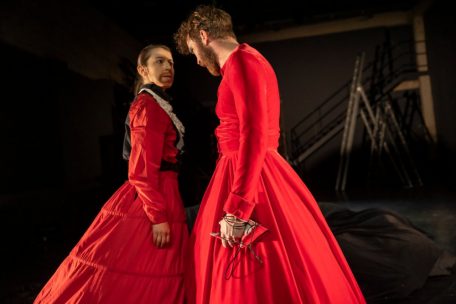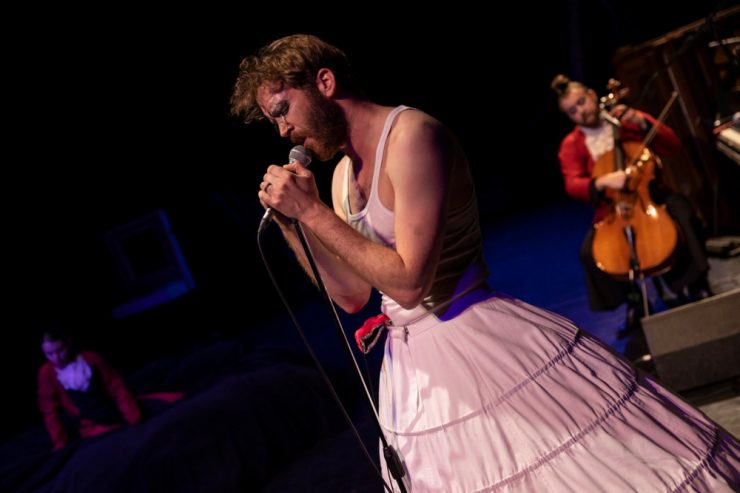It all begins with Anthime Miller singing Divine’s „You Think You’re A Man But You’re Only A Boy“, accompanying himself on his cello, picking its strings delicately before tapping the distortion pedal, giving the song an angrier edge. Towards the end of Miller’s reinterpretation, Larisa Faber, who starred in Simon’s adaptation of David Greig’s „Midsummer“, is frantically crossing the stage, looking for King Richard. The ruler seems to be hiding, shying away from carrying out his royal duties – the word „coward” will be uttered on several occasions, a barely conceiled comment on Europe’s ambiguous and reluctant stance towards Russia’s criminal invasion of Ukraine.
When Richard (Philippe Thelen) finally enters the stage – which is more of a dressing room, with ladders and fabric strewn across its centre and a makeup mirror in its left corner – he seems more than unwilling to slip into his royal persona, Queen Elizabeth (Larisa Faber) repeatedly reminding him of the roles and functions a king is supposed to assume.
„Richard II“ is Shakespeare’s first play about the House of Lancaster. At its incept, Henry Bolingbroke (the future Henry IV) accuses Thomas Mowbray of plotting and corruption – Mowbray’s charged with using money for „lewd employments“ and instigating the Duke of Gloucester’s death. As both are set upon a duel, Richard stops the fight before it can even begin, revealing the king’s incapacity in taking decisions, his inability to embody values considered manly such as firmness, strength and steadiness.
The story that then unfolds is one of improper ruling, war and political uprising – after the exiled Bolingbroke has been denied his inheritance, he returns to England and, as Richard returns from Ireland, he finds both his former followers and the common people rising against him, this upheaval having been unsurprisingly orchestrated by Bolingbroke.
As the original plot may seem rather complicated, filled to the brim with scheming men and talk about power and war, like a Game of Thrones episode without the fighting scenes, Anne Simon’s seen the necessity to dust off Shakespeare’s historical play and to frame it in a contemporary context.
This metamorphosis is achieved through different means and directorial ideas: at once by frequently switching the Bard’s original tongue not only with fragments of a rather convincing Luxembourgish translation, but also with plenty of intertextual morsels, be they historical (there’s a repeated quote of Queen Elisabeth insisting that although she may have „the body but of a weak and feeble woman“, she has „the heart and stomach of a king, and of a king of England too“), literary (there’s some Coleridge and some good old Goethe interspersed in the breaches of the hypotext) or cinematographic (the „Magnolia“ quotation „respect the cock and tame the cunt“ appears as a late leitmotiv towards the end of the play).
Lastly, there’s the (visual as well as semantic) gender metamorphosis, Richard appearing more and more effeminate while Faber’s Elisabeth grows a beard, Simon questioning a century-long conflation of manliness and power, of virility and ruling, re-enacting something like Judith Butler’s theories on gender and politics in a male-centred hypotext, as if sabotaging it from within.

„Ech si kuerz eraus“
There’s lots of silly fun and shenanigans on stage, with Larisa Faber’s voice deliberately sounding out of tune while she vocalizes and Philippe Thelen cursing in Luxembourgish, both actors occasionally browsing through Simon’s text version as if they forgot what part or character they are supposed to be playing (Thelen simply says: „Mesdames et Messieurs, ech si kuerz eraus“), revealing both gender and politics as mere roles you can slip in and out of. The fluid switches of gender and language show how re-enactment on stage can not only deconstruct, but also reimagine power relations, strip off their static and patriarchal nature and imagine an utopian world of fluxes: it almost seems as if Simon had intended to queer Deleuze’s theories of the schizophrenic.
The musical interludes, covering a wide spectrum from David Bowie’s „The Man Who Sold the World“ to the „Théiwesbuer“, are well chosen, with lyrics like „You Think You’re A Man But You’re Only A Toy/You Think You’re A Man But You Just Couldn’t See/You Weren’t Man Enough To Satisfy Me“ showing the queer, deconstructive nature of 80s pop music while colouring the play with queer politics, revealing gender to be a mere (political) construct.
Despite all this, Simon somehow seems to lose her audience midway after an impressive, dynamic and very fun first half. There’s too many layers, too many ideas unfolding on stage, too many disruptions, the play falling victim to its conceptual superstructure – a superstructure that will remain too opaque for many a spectator, some aspects being too indefinite, others bordering on the unreadable (for instance, one doesn’t really get why some parts of the text are proclaimed both in the original version and echoed in the Luxembourgish translation). Thus, the different breaks, interruptions and intertextual references, clever as they may be, make for a disassembled second half, even though the stage gradually transforms into a gorgeous canvas and Simon keeps up with her zany stage ideas.
If at its best moments, the queer, feminist angles of this reimagining interlock in a coherent and striking way, there are too many sequences where its multiple layers seem to head nowhere. Nonetheless, despite its moments of opacity and pointlessness, this is a daring, bold reimagining of a classic – which makes it even more incomprehensible that, during Wednesday’s representation, the audience showed very little enthusiasm and didn’t clap for more than a meagre and impolite fifteen seconds.
Info
Last representations on the third and fourth of May at eight PM

 Zu Demaart
Zu Demaart








Sie müssen angemeldet sein um kommentieren zu können